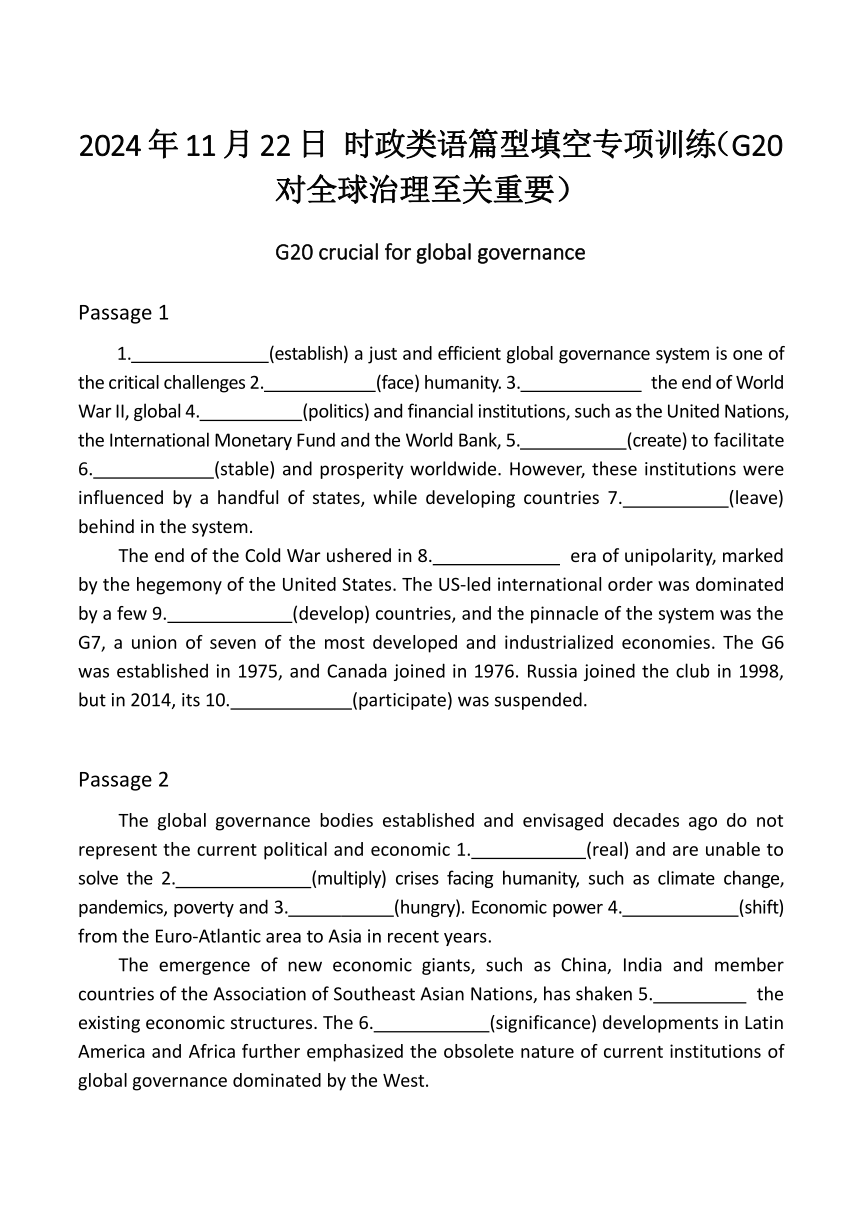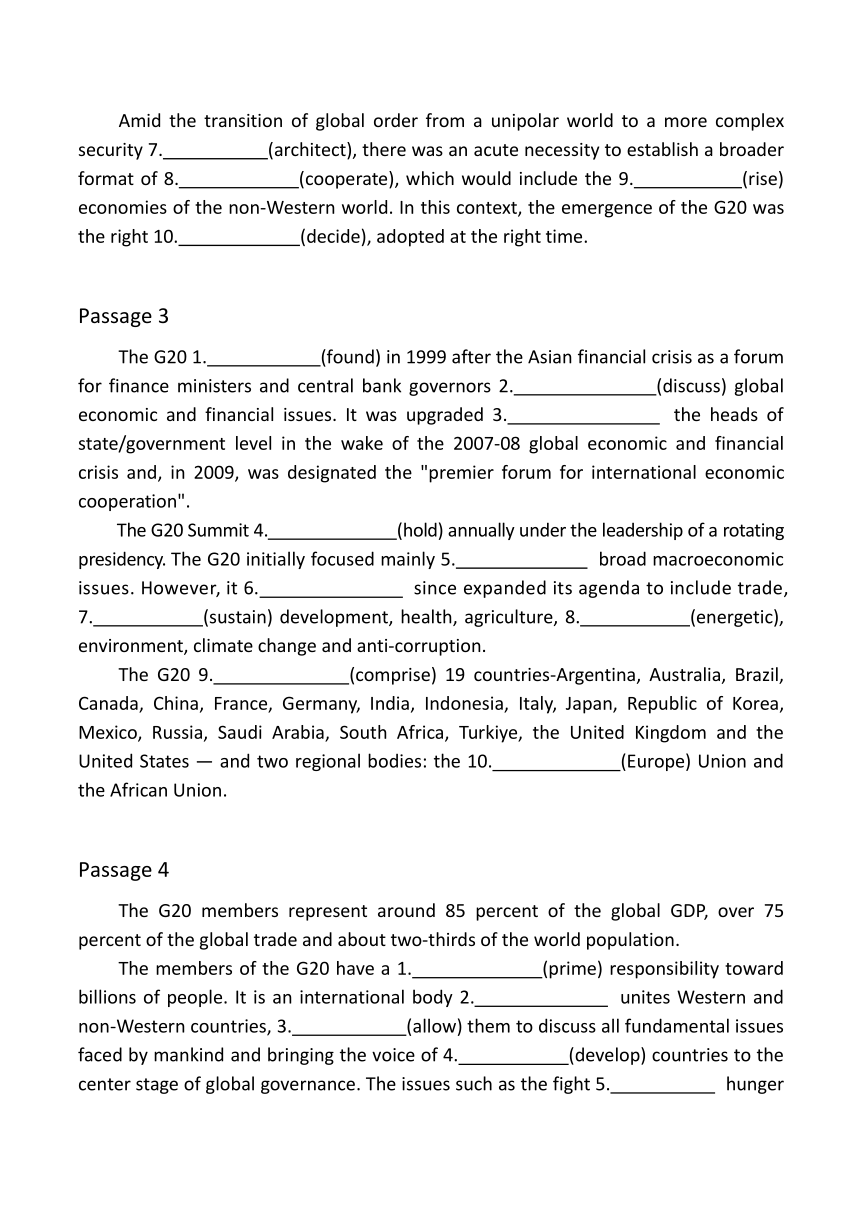2024年11月22日 时政类语篇型填空专项训练(G20对全球治理至关重要)(4篇,含答案与译文)-2025届高三英语复习
文档属性
| 名称 | 2024年11月22日 时政类语篇型填空专项训练(G20对全球治理至关重要)(4篇,含答案与译文)-2025届高三英语复习 |  | |
| 格式 | docx | ||
| 文件大小 | 28.4KB | ||
| 资源类型 | 教案 | ||
| 版本资源 | 人教版(2019) | ||
| 科目 | 英语 | ||
| 更新时间 | 2025-01-24 17:03:19 | ||
图片预览


文档简介
2024年11月22日 时政类语篇型填空专项训练(G20对全球治理至关重要)
G20 crucial for global governance
Passage 1
1. (establish) a just and efficient global governance system is one of the critical challenges 2. (face) humanity. 3. the end of World War II, global 4. (politics) and financial institutions, such as the United Nations, the International Monetary Fund and the World Bank, 5. (create) to facilitate 6. (stable) and prosperity worldwide. However, these institutions were influenced by a handful of states, while developing countries 7. (leave) behind in the system.
The end of the Cold War ushered in 8. era of unipolarity, marked by the hegemony of the United States. The US-led international order was dominated by a few 9. (develop) countries, and the pinnacle of the system was the G7, a union of seven of the most developed and industrialized economies. The G6 was established in 1975, and Canada joined in 1976. Russia joined the club in 1998, but in 2014, its 10. (participate) was suspended.
Passage 2
The global governance bodies established and envisaged decades ago do not represent the current political and economic 1. (real) and are unable to solve the 2. (multiply) crises facing humanity, such as climate change, pandemics, poverty and 3. (hungry). Economic power 4. (shift) from the Euro-Atlantic area to Asia in recent years.
The emergence of new economic giants, such as China, India and member countries of the Association of Southeast Asian Nations, has shaken 5. the existing economic structures. The 6. (significance) developments in Latin America and Africa further emphasized the obsolete nature of current institutions of global governance dominated by the West.
Amid the transition of global order from a unipolar world to a more complex security 7. (architect), there was an acute necessity to establish a broader format of 8. (cooperate), which would include the 9. (rise) economies of the non-Western world. In this context, the emergence of the G20 was the right 10. (decide), adopted at the right time.
Passage 3
The G20 1. (found) in 1999 after the Asian financial crisis as a forum for finance ministers and central bank governors 2. (discuss) global economic and financial issues. It was upgraded 3. the heads of state/government level in the wake of the 2007-08 global economic and financial crisis and, in 2009, was designated the "premier forum for international economic cooperation".
The G20 Summit 4. (hold) annually under the leadership of a rotating presidency. The G20 initially focused mainly 5. broad macroeconomic issues. However, it 6. since expanded its agenda to include trade, 7. (sustain) development, health, agriculture, 8. (energetic), environment, climate change and anti-corruption.
The G20 9. (comprise) 19 countries-Argentina, Australia, Brazil, Canada, China, France, Germany, India, Indonesia, Italy, Japan, Republic of Korea, Mexico, Russia, Saudi Arabia, South Africa, Turkiye, the United Kingdom and the United States — and two regional bodies: the 10. (Europe) Union and the African Union.
Passage 4
The G20 members represent around 85 percent of the global GDP, over 75 percent of the global trade and about two-thirds of the world population.
The members of the G20 have a 1. (prime) responsibility toward billions of people. It is an international body 2. unites Western and non-Western countries, 3. (allow) them to discuss all fundamental issues faced by mankind and bringing the voice of 4. (develop) countries to the center stage of global governance. The issues such as the fight 5. hunger and poverty occupy a significant place in the 6. (discuss) of the G20. At the initiative of the 2024 G20 Summit host country, Brazil, the Global Alliance Against Hunger and Poverty 7. (launch) on Nov 18, the first day of the summit.
In the declaration of the summit, G20 members reaffirmed the role of the G20 8. the premier forum for international economic cooperation. They emphasized a collective responsibility for the 9. (effect) stewardship of the global economy, fostering the conditions for sustainable, resilient, and inclusive global 10. (grow).
参考答案
参考答案1
1.Establishing 2.facing 3.After 4.political 5.were created
6.stability 7.were left 8.an 9.developed 10.participation
参考译文1
建立公正高效的全球治理体系是人类面临的重大挑战之一。第二次世界大战结束后,联合国、国际货币基金组织和世界银行等全球政治和金融机构成立,以促进全球的稳定和繁荣。然而,这些机构受到少数国家的影响,而发展中国家被抛在了体系后面。
冷战的结束开启了以美国霸权为标志的单极时代。美国主导的国际秩序由少数几个发达国家主导,该体系的顶峰是七国集团(G7),这是七个最发达和工业化经济体的联盟。G6成立于1975年,加拿大于1976年加入。俄罗斯于1998年加入,但在2014年,其参与被暂停。
参考答案2
1.realities 2.multiple 3.hunger 4.has shifted 5.up
6.significant 7.architecture 8.cooperation 9.rising 10.decision
参考译文2
几十年前建立和设想的全球治理机构并不代表当前的政治和经济现实,也无法解决气候变化、流行病、贫穷和饥饿等人类面临的多重危机。近年来,经济实力已从欧洲-大西洋地区转移到亚洲。中国、印度和东南亚国家联盟(asean)成员国等新经济大国的出现,动摇了现有的经济结构。拉丁美洲和非洲的重大发展进一步强调了当前由西方主导的全球治理机构的过时性质。
在全球秩序从单极世界向更复杂的安全架构转变的过程中,迫切需要建立一种更广泛的合作形式,其中将包括非西方世界的新兴经济体。在这种背景下,20国集团的出现是一个正确的决定,在正确的时间被采纳。
参考答案3
1.was founded 2.to discuss 3.to 4.is held 5.on
6.has 7.sustainable 8.energy 9.comprises 10.European
参考译文3
20国集团成立于1999年亚洲金融危机后,作为财长和央行行长讨论全球经济和金融问题的论坛。2007-08年全球经济和金融危机爆发后,论坛升格为国家元首/政府首脑级别,并于2009年被指定为“国际经济合作首要论坛”。
二十国集团领导人峰会由轮值主席国主持,每年举行一次。20国集团最初主要关注广泛的宏观经济问题。然而,它后来扩大了其议程,包括贸易、可持续发展、卫生、农业、能源、环境、气候变化和反腐败。
20国集团由19个国家组成,包括阿根廷、澳大利亚、巴西、加拿大、中国、法国、德国、印度、印度尼西亚、意大利、日本、韩国、墨西哥、俄罗斯、沙特阿拉伯、南非、土耳其、英国和美国,以及两个区域组织:欧盟和非洲联盟。
参考答案4
1.primary 2.that 3.allowing 4.developing 5.against
6.discussions 7.was launched 8.as 9.effective 10.growth
参考译文4
二十国集团成员经济总量占全球GDP总量的85%左右,贸易总量的75%以上,人口总量约占世界总人口的三分之二。
二十国集团成员对数十亿人负有首要责任。它是一个汇集西方和非西方国家的国际机构,可以讨论人类面临的所有根本性问题,并将发展中国家的声音置于全球治理的中心舞台。消除饥饿和贫困等问题在二十国集团的讨论中占有重要地位。在2024年G20峰会主办国巴西的倡议下,全球反饥饿与贫困联盟于峰会首日11月18日正式成立。
二十国集团成员在峰会宣言中重申了二十国集团作为国际经济合作主要论坛的作用。他们强调有效管理全球经济的集体责任,为可持续、有韧性和包容性的全球增长创造条件。
G20 crucial for global governance
Passage 1
1. (establish) a just and efficient global governance system is one of the critical challenges 2. (face) humanity. 3. the end of World War II, global 4. (politics) and financial institutions, such as the United Nations, the International Monetary Fund and the World Bank, 5. (create) to facilitate 6. (stable) and prosperity worldwide. However, these institutions were influenced by a handful of states, while developing countries 7. (leave) behind in the system.
The end of the Cold War ushered in 8. era of unipolarity, marked by the hegemony of the United States. The US-led international order was dominated by a few 9. (develop) countries, and the pinnacle of the system was the G7, a union of seven of the most developed and industrialized economies. The G6 was established in 1975, and Canada joined in 1976. Russia joined the club in 1998, but in 2014, its 10. (participate) was suspended.
Passage 2
The global governance bodies established and envisaged decades ago do not represent the current political and economic 1. (real) and are unable to solve the 2. (multiply) crises facing humanity, such as climate change, pandemics, poverty and 3. (hungry). Economic power 4. (shift) from the Euro-Atlantic area to Asia in recent years.
The emergence of new economic giants, such as China, India and member countries of the Association of Southeast Asian Nations, has shaken 5. the existing economic structures. The 6. (significance) developments in Latin America and Africa further emphasized the obsolete nature of current institutions of global governance dominated by the West.
Amid the transition of global order from a unipolar world to a more complex security 7. (architect), there was an acute necessity to establish a broader format of 8. (cooperate), which would include the 9. (rise) economies of the non-Western world. In this context, the emergence of the G20 was the right 10. (decide), adopted at the right time.
Passage 3
The G20 1. (found) in 1999 after the Asian financial crisis as a forum for finance ministers and central bank governors 2. (discuss) global economic and financial issues. It was upgraded 3. the heads of state/government level in the wake of the 2007-08 global economic and financial crisis and, in 2009, was designated the "premier forum for international economic cooperation".
The G20 Summit 4. (hold) annually under the leadership of a rotating presidency. The G20 initially focused mainly 5. broad macroeconomic issues. However, it 6. since expanded its agenda to include trade, 7. (sustain) development, health, agriculture, 8. (energetic), environment, climate change and anti-corruption.
The G20 9. (comprise) 19 countries-Argentina, Australia, Brazil, Canada, China, France, Germany, India, Indonesia, Italy, Japan, Republic of Korea, Mexico, Russia, Saudi Arabia, South Africa, Turkiye, the United Kingdom and the United States — and two regional bodies: the 10. (Europe) Union and the African Union.
Passage 4
The G20 members represent around 85 percent of the global GDP, over 75 percent of the global trade and about two-thirds of the world population.
The members of the G20 have a 1. (prime) responsibility toward billions of people. It is an international body 2. unites Western and non-Western countries, 3. (allow) them to discuss all fundamental issues faced by mankind and bringing the voice of 4. (develop) countries to the center stage of global governance. The issues such as the fight 5. hunger and poverty occupy a significant place in the 6. (discuss) of the G20. At the initiative of the 2024 G20 Summit host country, Brazil, the Global Alliance Against Hunger and Poverty 7. (launch) on Nov 18, the first day of the summit.
In the declaration of the summit, G20 members reaffirmed the role of the G20 8. the premier forum for international economic cooperation. They emphasized a collective responsibility for the 9. (effect) stewardship of the global economy, fostering the conditions for sustainable, resilient, and inclusive global 10. (grow).
参考答案
参考答案1
1.Establishing 2.facing 3.After 4.political 5.were created
6.stability 7.were left 8.an 9.developed 10.participation
参考译文1
建立公正高效的全球治理体系是人类面临的重大挑战之一。第二次世界大战结束后,联合国、国际货币基金组织和世界银行等全球政治和金融机构成立,以促进全球的稳定和繁荣。然而,这些机构受到少数国家的影响,而发展中国家被抛在了体系后面。
冷战的结束开启了以美国霸权为标志的单极时代。美国主导的国际秩序由少数几个发达国家主导,该体系的顶峰是七国集团(G7),这是七个最发达和工业化经济体的联盟。G6成立于1975年,加拿大于1976年加入。俄罗斯于1998年加入,但在2014年,其参与被暂停。
参考答案2
1.realities 2.multiple 3.hunger 4.has shifted 5.up
6.significant 7.architecture 8.cooperation 9.rising 10.decision
参考译文2
几十年前建立和设想的全球治理机构并不代表当前的政治和经济现实,也无法解决气候变化、流行病、贫穷和饥饿等人类面临的多重危机。近年来,经济实力已从欧洲-大西洋地区转移到亚洲。中国、印度和东南亚国家联盟(asean)成员国等新经济大国的出现,动摇了现有的经济结构。拉丁美洲和非洲的重大发展进一步强调了当前由西方主导的全球治理机构的过时性质。
在全球秩序从单极世界向更复杂的安全架构转变的过程中,迫切需要建立一种更广泛的合作形式,其中将包括非西方世界的新兴经济体。在这种背景下,20国集团的出现是一个正确的决定,在正确的时间被采纳。
参考答案3
1.was founded 2.to discuss 3.to 4.is held 5.on
6.has 7.sustainable 8.energy 9.comprises 10.European
参考译文3
20国集团成立于1999年亚洲金融危机后,作为财长和央行行长讨论全球经济和金融问题的论坛。2007-08年全球经济和金融危机爆发后,论坛升格为国家元首/政府首脑级别,并于2009年被指定为“国际经济合作首要论坛”。
二十国集团领导人峰会由轮值主席国主持,每年举行一次。20国集团最初主要关注广泛的宏观经济问题。然而,它后来扩大了其议程,包括贸易、可持续发展、卫生、农业、能源、环境、气候变化和反腐败。
20国集团由19个国家组成,包括阿根廷、澳大利亚、巴西、加拿大、中国、法国、德国、印度、印度尼西亚、意大利、日本、韩国、墨西哥、俄罗斯、沙特阿拉伯、南非、土耳其、英国和美国,以及两个区域组织:欧盟和非洲联盟。
参考答案4
1.primary 2.that 3.allowing 4.developing 5.against
6.discussions 7.was launched 8.as 9.effective 10.growth
参考译文4
二十国集团成员经济总量占全球GDP总量的85%左右,贸易总量的75%以上,人口总量约占世界总人口的三分之二。
二十国集团成员对数十亿人负有首要责任。它是一个汇集西方和非西方国家的国际机构,可以讨论人类面临的所有根本性问题,并将发展中国家的声音置于全球治理的中心舞台。消除饥饿和贫困等问题在二十国集团的讨论中占有重要地位。在2024年G20峰会主办国巴西的倡议下,全球反饥饿与贫困联盟于峰会首日11月18日正式成立。
二十国集团成员在峰会宣言中重申了二十国集团作为国际经济合作主要论坛的作用。他们强调有效管理全球经济的集体责任,为可持续、有韧性和包容性的全球增长创造条件。
